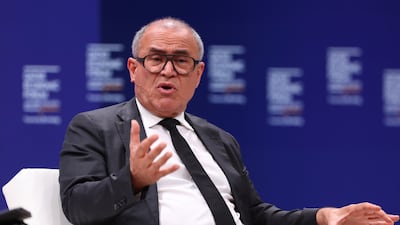Inflation is projected to remain “more persistent” as a result of geopolitical tensions and tightness of the labour markets, despite monetary policy efforts to tame it, according to a top economist.
“Inflation is going to surprise on the upside, both in the United States and in Europe,” Nouriel Roubini, professor emeritus of economics and international business at New York University's Stern School of Business, told the Qatar Economic Forum on Wednesday.
“Labour markets are very tight and the unemployment rate is at historical lows,” he said, adding that ageing populations and restrictions to migration was also affecting inflation.
“Geopolitical tensions are going to fragment the world that may lead to further spikes in commodity prices,” Mr Roubini, who is also the chief executive of Roubini Macro Associates, said.
Inflation continues to remain high in the US, the world’s largest economy, and the EU as a result of supply chain disruptions caused due to the coronavirus pandemic, geopolitical tensions between major world powers, as well as the Ukraine conflict.
Inflation in the US peaked last June at 9.1 per cent, the highest it has been since 1981.
The US Federal Reserve this month once again raised interest rates, marking its 10th consecutive increase as it aims to rein in inflation.
The Fed bumped up the policy rate for a third consecutive time this year by 25 basis points as it seeks to bring inflation down to its target range of 2 per cent.
“The Fed is not done yet, even in June, we may have another hike and certainly the ECB [European Central Bank] has much more work to do,” said Mr Roubini, who is known for his doom-laden predictions.
“The tightness of the labour markets, the existence of geopolitical stuff and other factors imply that inflation is going to be more persistent, is falling but not fast enough.”
The annual rate of inflation in the UK fell to 8.7 per cent in April, compared with 10.1 per cent the month before, according to the Office for National Statistics, Mr Roubini said.
Central banks are facing a “dilemma or a better trilemma”, as they focus on trying to achieve price and financial stability while trying to avoid a hard landing.
“If they have to raise rates more, as I expect, to fight inflation, eventually, there may be a hard landing and financial instability and if they don't raise rates enough then there's a risk of the de-anchoring of inflation and inflation expectations,” said Mr Roubini.
“So, I commend them for what they have done.
“I think that the big challenges are going to be ahead of us.”

Meanwhile, speaking on the same panel, Qatar's Central Bank governor Sheikh Bandar bin Mohammed Al Thani said the country's currency will remain pegged to the US dollar since its monetary policy is appropriate for Qatar's economy.
“Our main export is energy and the main revenue is in dollars so it is a very appropriate policy to have to keep our currency pegged to the US dollar. We don't see an immediate need to change that policy,” Mr Al Thani said.
He also said the US dollar will remain as a primary currency for international trade settlement due to its “global acceptance, stability, backed by a strong economy in the US”.


